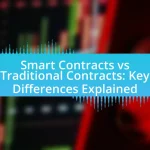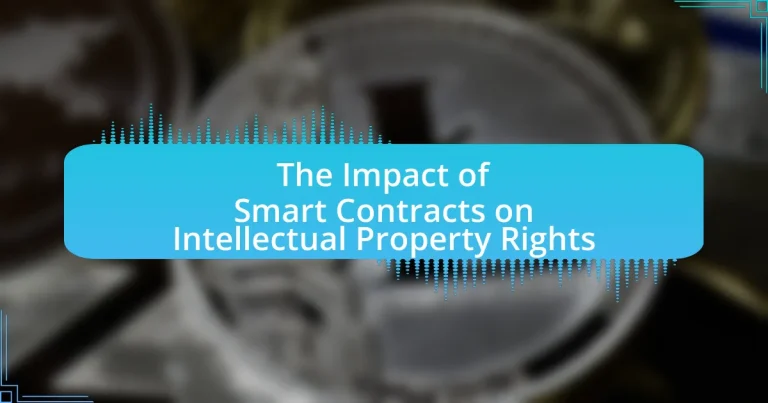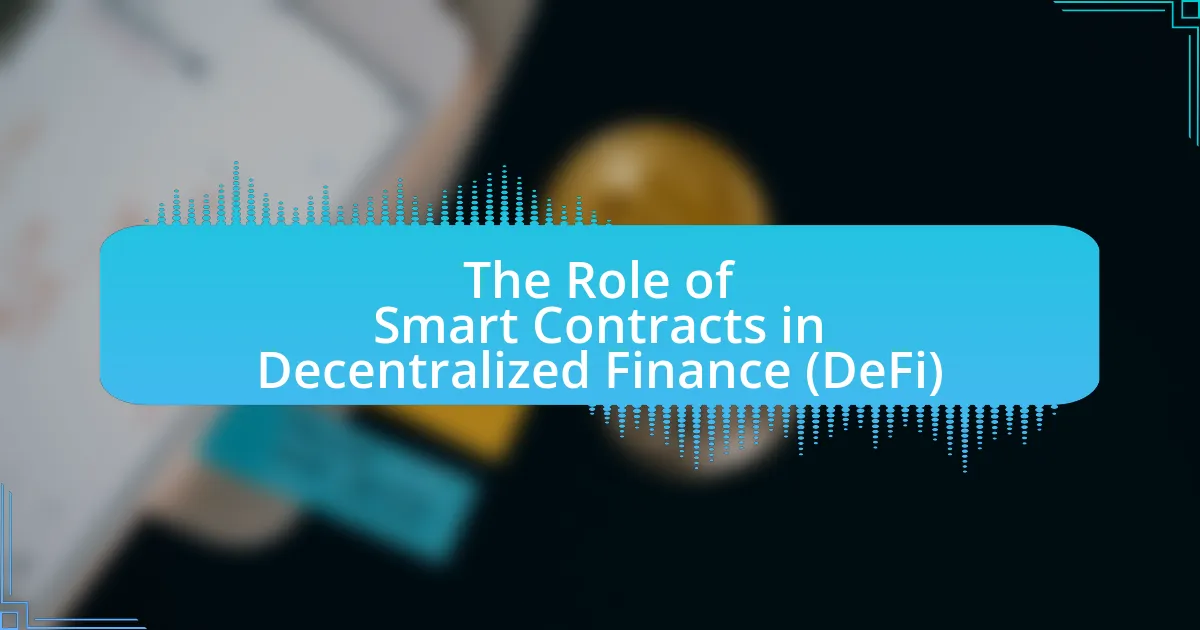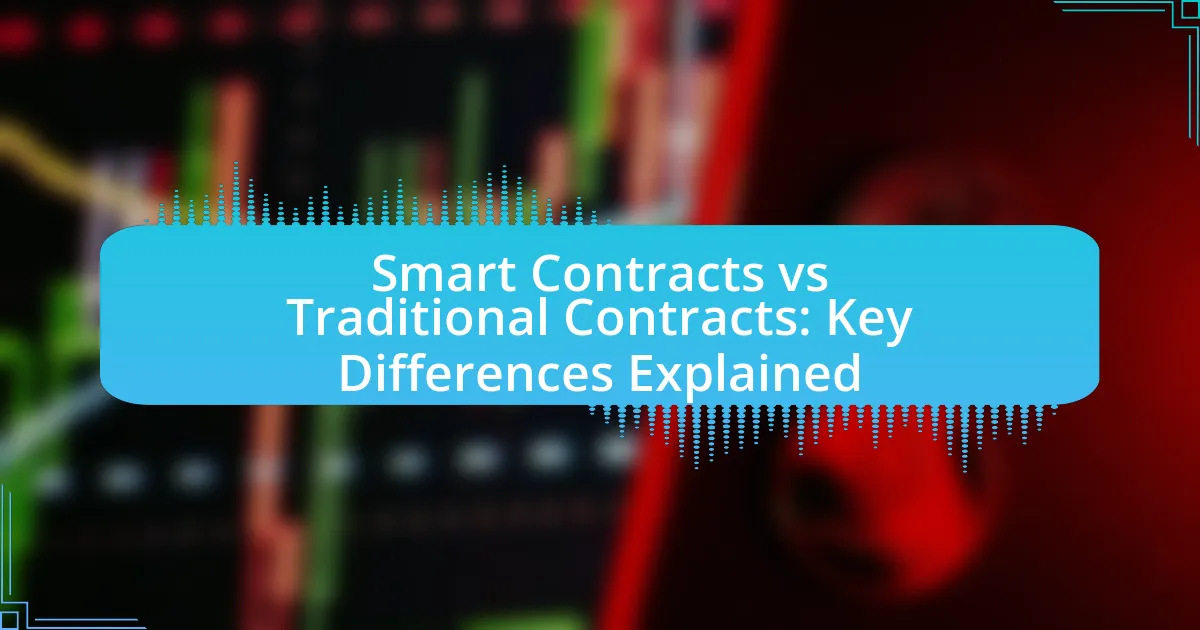Smart contracts are self-executing agreements coded on blockchain technology that automate the enforcement and management of intellectual property rights. This article explores how smart contracts enhance the protection of intellectual property by automating licensing agreements, ensuring timely royalty payments, and providing immutable records of ownership. It also addresses the challenges posed by smart contracts, including legal enforceability, jurisdictional issues, and the need for updated regulatory frameworks. Additionally, the article highlights the economic advantages for creators and innovators, such as cost savings and faster transactions, while discussing best practices for implementing smart contracts in compliance with existing intellectual property laws.

What are Smart Contracts and How Do They Relate to Intellectual Property Rights?
Smart contracts are self-executing contracts with the terms of the agreement directly written into code, operating on blockchain technology. They facilitate, verify, and enforce the negotiation or performance of a contract without the need for intermediaries. In relation to intellectual property rights, smart contracts can automate licensing agreements, ensuring that creators receive royalties automatically when their work is used, thereby enhancing the protection of intellectual property. For example, a study by the World Intellectual Property Organization (WIPO) highlights that smart contracts can streamline the management of copyright and patent rights, reducing infringement risks and improving transparency in transactions.
How do smart contracts function in the context of intellectual property?
Smart contracts function in the context of intellectual property by automating the enforcement and management of IP rights through self-executing agreements coded on blockchain technology. These contracts facilitate the automatic execution of terms, such as licensing agreements or royalty payments, when predefined conditions are met, thereby reducing the need for intermediaries and minimizing disputes. For instance, a smart contract can automatically transfer ownership of a digital artwork upon payment, ensuring that the creator receives royalties instantly and securely. This mechanism enhances transparency and traceability, as all transactions are recorded on the blockchain, providing an immutable proof of ownership and usage rights.
What are the key features of smart contracts that impact intellectual property rights?
The key features of smart contracts that impact intellectual property rights include automation, transparency, and immutability. Automation allows for the execution of agreements without intermediaries, reducing the risk of human error and ensuring that terms are enforced as programmed. Transparency ensures that all parties have access to the same information, which can help in verifying ownership and usage rights of intellectual property. Immutability means that once a smart contract is deployed on a blockchain, it cannot be altered, providing a secure and permanent record of ownership and transaction history. These features collectively enhance the protection and management of intellectual property rights by facilitating trust and reducing disputes.
How do smart contracts automate processes related to intellectual property?
Smart contracts automate processes related to intellectual property by executing predefined agreements automatically when specific conditions are met. This automation streamlines tasks such as licensing, royalty payments, and ownership transfers, reducing the need for intermediaries. For instance, a smart contract can automatically distribute royalties to creators based on usage data recorded on a blockchain, ensuring timely and accurate payments. Additionally, smart contracts can enforce licensing terms by restricting access to digital assets unless conditions are fulfilled, thereby protecting intellectual property rights effectively.
What challenges do smart contracts present for intellectual property rights?
Smart contracts present significant challenges for intellectual property rights by complicating ownership verification and enforcement. The decentralized nature of blockchain technology, where smart contracts operate, can lead to disputes over authorship and rights management, as traditional legal frameworks may not adequately address these new paradigms. For instance, once a smart contract is deployed, altering its terms can be difficult, potentially locking creators into unfavorable agreements. Additionally, the anonymity of blockchain participants can hinder the identification of rights holders, making it challenging to enforce intellectual property protections. These issues highlight the need for updated legal frameworks that can accommodate the unique characteristics of smart contracts in relation to intellectual property rights.
What legal issues arise from the use of smart contracts in intellectual property?
Legal issues arising from the use of smart contracts in intellectual property include questions of enforceability, copyright infringement, and jurisdictional challenges. Smart contracts, being self-executing agreements coded on blockchain, may lack the legal recognition necessary for enforceability in some jurisdictions, leading to disputes over their validity. Additionally, the automated nature of smart contracts can inadvertently facilitate copyright infringement if they distribute or utilize copyrighted materials without proper licensing, raising liability concerns for creators and users alike. Jurisdictional challenges emerge as smart contracts operate across borders, complicating the application of local intellectual property laws and creating uncertainty regarding which legal framework applies in case of disputes.
How do jurisdictional differences affect the enforcement of smart contracts?
Jurisdictional differences significantly affect the enforcement of smart contracts by creating variations in legal recognition, regulatory frameworks, and dispute resolution mechanisms. Different jurisdictions may have distinct laws regarding contract validity, which can lead to challenges in enforcing smart contracts that rely on automated execution and blockchain technology. For instance, some jurisdictions may not recognize the legal status of smart contracts, while others may have specific regulations that govern their use, impacting their enforceability in legal disputes. Additionally, the lack of uniformity in international laws can complicate cross-border transactions, as parties may face differing interpretations of contract terms and obligations. This inconsistency can hinder the reliability of smart contracts as a tool for intellectual property rights management, as enforcement may vary based on the location of the parties involved and the applicable legal standards in each jurisdiction.

What are the Benefits of Using Smart Contracts for Intellectual Property Rights?
Smart contracts provide significant benefits for intellectual property rights by enhancing security, automating processes, and ensuring transparency. These digital agreements are self-executing and enforceable, which reduces the risk of infringement and unauthorized use of intellectual property. For instance, smart contracts can automatically execute royalty payments when a piece of intellectual property is used, ensuring that creators receive fair compensation without the need for intermediaries. Additionally, the immutable nature of blockchain technology, which underpins smart contracts, ensures that ownership records are secure and tamper-proof, thereby reducing disputes over intellectual property ownership. According to a report by the World Intellectual Property Organization, the integration of blockchain and smart contracts can streamline licensing processes and improve the efficiency of rights management in the creative industries.
How do smart contracts enhance the protection of intellectual property?
Smart contracts enhance the protection of intellectual property by automating the enforcement of rights and ensuring transparent transactions. They utilize blockchain technology to create immutable records of ownership and licensing agreements, which reduces the risk of infringement and unauthorized use. For instance, when a creator registers their work on a blockchain via a smart contract, the contract automatically executes terms such as royalties and usage rights, ensuring that creators receive compensation whenever their work is used. This automation and transparency significantly deter potential violations, as all transactions are publicly verifiable and traceable on the blockchain.
What role do smart contracts play in reducing infringement risks?
Smart contracts play a crucial role in reducing infringement risks by automating and enforcing the terms of agreements in a transparent manner. These self-executing contracts, built on blockchain technology, ensure that all parties adhere to the agreed-upon conditions, thereby minimizing the potential for unauthorized use or distribution of intellectual property. For instance, smart contracts can automatically execute licensing agreements, ensuring that payments are made only when the terms are met, which significantly lowers the risk of infringement. Additionally, the immutable nature of blockchain records provides a verifiable audit trail, making it easier to prove ownership and usage rights, further deterring potential infringers.
How can smart contracts streamline licensing agreements for intellectual property?
Smart contracts can streamline licensing agreements for intellectual property by automating the execution and enforcement of contract terms. This automation reduces the need for intermediaries, minimizes administrative costs, and enhances transaction speed. For instance, smart contracts can automatically execute royalty payments when a licensed work is used, ensuring timely compensation for creators. According to a study by the World Economic Forum, the use of blockchain technology, which underpins smart contracts, can reduce transaction costs by up to 90% in certain scenarios. This efficiency not only benefits licensors and licensees but also fosters a more transparent and secure environment for intellectual property transactions.
What economic advantages do smart contracts offer to creators and innovators?
Smart contracts provide significant economic advantages to creators and innovators by automating transactions and reducing costs associated with intermediaries. By eliminating the need for third-party involvement, such as lawyers or brokers, creators can retain a larger share of their revenue. For instance, a study by the World Economic Forum estimates that smart contracts could save businesses up to $3 trillion annually by streamlining processes and minimizing transaction fees. Additionally, smart contracts enhance transparency and security, which can lead to increased trust among users and potential investors, further driving economic growth for creators and innovators.
How do smart contracts facilitate faster transactions in intellectual property?
Smart contracts facilitate faster transactions in intellectual property by automating the execution of agreements and eliminating the need for intermediaries. This automation allows for immediate enforcement of terms, such as licensing agreements or royalty payments, once predefined conditions are met. For instance, a smart contract can automatically transfer ownership of a digital asset upon payment, significantly reducing the time required for traditional transaction processes, which often involve lengthy negotiations and paperwork. According to a report by the World Economic Forum, the use of smart contracts can reduce transaction times from days or weeks to mere minutes, thereby enhancing efficiency in the management of intellectual property rights.
What cost savings can be achieved through the use of smart contracts?
Smart contracts can achieve significant cost savings by automating processes and reducing the need for intermediaries. By executing transactions automatically when predefined conditions are met, smart contracts minimize administrative overhead and legal fees associated with traditional contract management. For instance, a study by the World Economic Forum estimates that smart contracts could save businesses up to $3 trillion annually by streamlining operations and reducing fraud. Additionally, the elimination of intermediaries, such as lawyers and notaries, further decreases costs, as transactions can be executed directly between parties on a blockchain platform.

What are the Future Implications of Smart Contracts on Intellectual Property Rights?
Smart contracts will significantly transform intellectual property rights by automating licensing, enhancing transparency, and reducing infringement. These self-executing contracts, built on blockchain technology, allow creators to set specific terms for the use of their intellectual property, ensuring that royalties are automatically distributed upon usage. For instance, a study by the World Intellectual Property Organization (WIPO) highlights that smart contracts can streamline the management of rights in creative industries, potentially increasing revenue for artists and reducing disputes over ownership. Furthermore, the immutable nature of blockchain records provides a reliable proof of ownership, which can deter unauthorized use and enhance enforcement of rights.
How might smart contracts evolve to better serve intellectual property rights?
Smart contracts may evolve to better serve intellectual property rights by incorporating automated licensing and royalty distribution mechanisms. These advancements can ensure that creators receive fair compensation in real-time as their works are used, thereby reducing the risk of infringement and unauthorized use. For instance, platforms like Ethereum are already enabling decentralized applications that facilitate these processes, allowing for transparent and tamper-proof transactions. Additionally, integrating artificial intelligence could enhance the ability of smart contracts to identify and enforce rights, as AI can analyze usage patterns and detect potential violations more effectively. This evolution aligns with the growing demand for more efficient and secure management of intellectual property in the digital age.
What technological advancements could enhance smart contracts in this field?
Blockchain interoperability can enhance smart contracts in the field of intellectual property rights by enabling seamless communication between different blockchain networks. This advancement allows for the integration of various smart contract platforms, facilitating the transfer and verification of intellectual property assets across ecosystems. For instance, projects like Polkadot and Cosmos focus on creating frameworks for interoperability, which can significantly improve the efficiency and accessibility of smart contracts related to intellectual property. Additionally, advancements in artificial intelligence can automate the enforcement of smart contracts by analyzing data and ensuring compliance with licensing agreements, thereby reducing disputes and enhancing trust among parties involved.
How can regulatory frameworks adapt to the rise of smart contracts in intellectual property?
Regulatory frameworks can adapt to the rise of smart contracts in intellectual property by incorporating specific provisions that recognize and govern the use of these digital agreements. This adaptation involves updating existing laws to include definitions and legal recognition of smart contracts, ensuring they are enforceable under intellectual property regulations. For instance, jurisdictions like the European Union are already exploring the integration of blockchain technology into their legal systems, which can serve as a model for how smart contracts can be validated and enforced in IP law. Additionally, regulatory bodies can establish guidelines that address issues such as copyright ownership, licensing, and dispute resolution specifically tailored for smart contracts, thereby providing clarity and protection for creators and users alike.
What best practices should be followed when implementing smart contracts for intellectual property?
When implementing smart contracts for intellectual property, best practices include ensuring clarity in contract terms, utilizing robust security measures, and incorporating compliance with relevant laws. Clarity in contract terms is essential to avoid ambiguities that could lead to disputes; for instance, clearly defining ownership rights and usage permissions can prevent misunderstandings. Robust security measures, such as encryption and secure coding practices, protect against unauthorized access and potential breaches, which are critical given the irreversible nature of blockchain transactions. Compliance with intellectual property laws, including copyright and trademark regulations, ensures that the smart contract adheres to legal standards, thereby reducing the risk of legal challenges. These practices are supported by the increasing adoption of smart contracts in various industries, which highlights the importance of establishing clear guidelines to safeguard intellectual property rights effectively.
How can stakeholders ensure compliance with existing intellectual property laws?
Stakeholders can ensure compliance with existing intellectual property laws by implementing robust monitoring systems and conducting regular audits of their intellectual property assets. These systems help identify potential infringements and ensure that all intellectual property is properly registered and protected under relevant laws. For instance, according to the World Intellectual Property Organization, effective management of intellectual property rights can reduce the risk of infringement and enhance the value of these assets. Additionally, stakeholders should provide training and resources to employees about intellectual property laws to foster a culture of compliance within the organization.
What strategies can be employed to educate creators about smart contracts?
To educate creators about smart contracts, targeted workshops and online courses can be employed as effective strategies. These educational formats allow creators to engage with the material interactively, facilitating a deeper understanding of smart contracts’ functionalities and implications for intellectual property rights. For instance, platforms like Coursera and Udemy offer specialized courses that cover the basics of blockchain technology and smart contracts, often designed by industry experts. Additionally, case studies showcasing successful implementations of smart contracts in various creative industries can provide practical insights, reinforcing the theoretical knowledge gained in workshops and courses.















